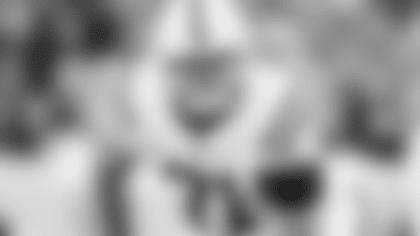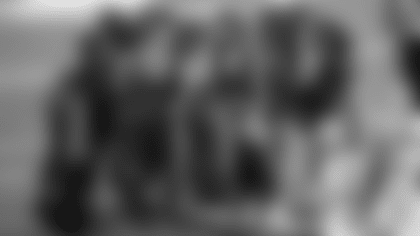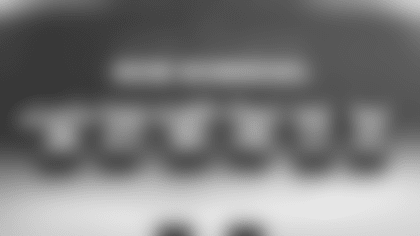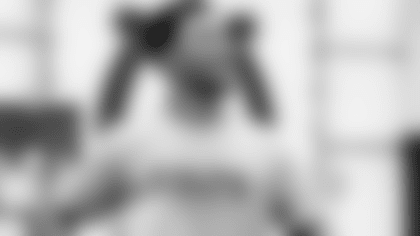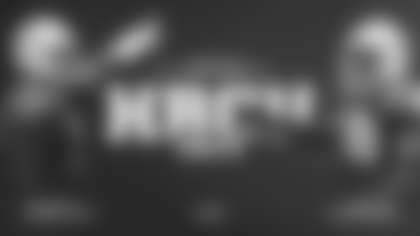INDIANAPOLIS — Throughout the offseason, the media doesn't catch up with the Indianapolis Colts coordinators often, so today's sessions with defensive coordinator Matt Eberflus and offensive coordinator Nick Sirianni were very informative.
The two first-time coordinators have now had offseason workouts, OTAs and are almost through with mandatory minicamp to evaluate their players. Here are the takeaways about how Eberflus feels about the defense.
— Eberflus "One thing that we are constantly evaluating is – the basis of our defense is really quickness and instincts. We have had the ability to do some of that with those two things, quickness and instincts. The main thing we are going to look for now once we get the pads on is the striking ability, hitting with the top of your shoulder pads and all those things and guys that want to do that. We've always said that we will be a good tackling team when our corners tackle and we will be a good hustling team when our d-line hustles. So we are always looking at those two things and those two groups."
"Speed is certainly a factor, but without quickness and instincts – if you just have straight line speed, we have all seen the guys – that was a good question. But we have all seen the track athletes try to play football and it doesn't work. So speed is certainly an element to it, but first and foremost, the quickness and instincts have got to be there along with the striking ability relative to your position. Then obviously you want athletic speed players at that point."
● "Speed" and "athleticism" have been the hot buzz words surrounding the Colts' new defense all offseason, but it's good for Eberflus to elaborate on what it will take to succeed in this scheme. While every position group will naturally have different responsibilities, everybody has to have some of the same traits and effort level. On the note of speed, Eberflus made a great example of why players who only offer speed don't always work out. You have to be able to shift with that speed and have different movement skills to go with it.
-------------
Q: "What do you like about Kenny Moore?"
Eberflus: "Well, I think he is a player that we look for in terms of showing what our system is about. In terms of his hustle, his mental makeup, his character and what he displays on the football field. He has done a really good job of that this spring so far. We are anxious to see him when we get the pads on. I know things adjust during that time but he has done a really good job for us up to this point."
● Moore is seldom mentioned outside of the building when talking about the Colts' secondary, but he did quite well as a starter last year when called upon — especially considering his status as an undrafted rookie. His hard work is being noticed this offseason, as he has been moving around a bit in the secondary from corner to nickel. Moore has been consistently present, filling in while some players have been unavailable.
-------------
— Q: "With the guys that are missing time, what are they missing and how far will they be behind?"
Eberflus: "Yeah, I mean when you are implementing a new system and a new style, I think that every rep is important. So to diminish that would be disrespectful to the game and I think to the players that have been in there. So to miss any rep albeit at walkthrough or team reps at this time of year is very critical. We will get those guys caught up to speed the best we can and we have done that to this point with what we are able to do in terms of cone drills, walkthroughs and stuff that is not impactful. But they have some catching up to do and they have to show what they are made of in terms of their learning abilities and their play ability. It doesn't matter if it was a first round pick or if it's a free agent. Everybody is held to the same standard and we are going to be looking at what they are doing in terms of their learning and their execution on the field."
● Unless specifically told what's going on, it's often left to the imagination what players are doing in rehab/individual work while not fully participating with the rest of the team in practice. There are several important players who have not been able to fully practice lately, so knowing that they are physically and mentally being kept as updated as possible through specialized drills and slow-pace walkthroughs is good to hear. Remember: NFL teams aren't obligated to release an injury report during their offseason workout program, so we'll likely have to wait until training camp to get a better picture on the injuries that have kept some key players off the practice field.
-------------
— Q: "When you talk about striking ability in full pads, I assume you need to see full tackling to evaluate that in training camp?"
Eberflus: "No, I would not say that. I would not say that. Good question though because you want to minimize those opportunities to preseason games in terms of full tackling. So what we do is we kind of gauge and adjust our practice. So we have levels of practice. Right now we are in a situation where we are really in a tag period. These are all tag because we are only in helmets. Guys will hit the ball with leverage inside out which we call pursue or outside in we call force and they will leverage that or what we call cup the ball at that point. But they will be tagging through the football so it will be a low impact situation for our players and the offense. So we are going to tag through the ball. We are going to punch, hammer and rake the football but we are going to tag with leverage. Once we get the pads on we elevate that to a thud period. So thud means that I am going to put my body and my pads on the guy and still punch, hammer and rake the ball but now I am in a hitting position. I do thud him, but then I let him go. There is no wrap. There is no run. There is no pull in tackle. So you are able to get your body on him, work your angles, work your leverage points and then at that point work your hitting too in a safe way."
● Here, Eberflus breaks down the thought process coaches go through when determining how much contact will be used in practice depending on their level of padding. He also makes sure to explain how they can still make the most of their time on the field physically as a defense without actually wrapping-up ball carriers and tackling them. It's another opportunity to put an emphasis on forcing fumbles as well.
-------------
— Q: "Are you taking the approach that every starting spot on defense is up for grabs?"
Eberflus: "Yeah, I was just talking to the linebackers today and I said, 'Hey, we have 10 guys in here. One through 10 we have no idea who is one and we have no idea who is 10.' So the competition is up in the air and that's at every position. It doesn't matter if it's d-tackle, defensive end or DBs. I think that's a healthy thing. Everything is up for grabs and the opportunity is out there for everybody and we are excited about that. It's about doing the work and about showing that you can execute and hit the football. That's what it's about."
Q: "Do you think it will play itself out over training camp?"
Eberflus: "Yeah I think it will play itself out all the way through. I don't think it's once training camp is over that we are solidifying certain spots. That is a rep-to-rep, week-to-week, day-to-day operation in terms of evaluating your talent and evaluating what you have. I think when you have young players, a lot of times there is a learning curve. They are going to start here and work their way up and all of a sudden take off. So you have to really look at that on a day-to-day and week-to-week basis because of the ascension of players and guys plateauing and all those types of things."
● In a brand new defensive scheme in which much of the roster has been turned over in the last two offseasons, it should be expected for there to be many new faces in starting spots all over. With how many players seen going in and out of the lineup, bouncing from reps with the first and second teams, it is evident that the coaches are still evaluating which players offer what. Much of the offseason so far has been about players learning the system while the coaches teach, and learn about, the players. Come training camp, players' roles will develop and become more defined. However, as Eberflus points out, the end of training camp doesn't signify an end to the competition. Spots will always be up for grabs for those deserving. With that said, just because a player isn't starting doesn't mean they won't get playing time. This defense will rely on waves and rotations of players so fresh pursuit is always in play against the offense.
-------------
— Eberflus: "We are looking at who complements who and who can play the positions. You are always looking for – when you are formalizing your depth chart, say you are going to have eight defensive linemen up for the game, six linebackers and eight DBs. That's typical with a 4-3 scheme and it adjusts here and there number by number based on injury and stuff. But what you are looking for is not only the starters but you're looking to develop your depth. So we always look for at each position – left end, right end, under tackle, nose tackle, SAM, MIKE, WILL, left corner, right corner, safety, safety, and nickel – all those spots we are looking for a pair and a spare that's trained in those spots. So that's our job as coaches to make sure that, can a guy can physically do it and can he mentally can do it? Can a guy play left corner and nickel? Can he play right corner and dime? Can a guy play strong safety and dime? Can he play MIKE or WILL? Can he play those positions? Can he do all those different things? Physically and mentally, can he get it done? Then you are always looking for – like I said – a pair and a spare at each position."
● Here, we get a look at what the Colts' personnel plans may be on a typical gameday in the regular season. Not accounting for future injuries, the Colts would like to have eight defensive linemen, six linebackers and eight defensive backs active for gamedays. Because of league rules, not all 53 players can be active on gameday, so the players who are active have to be able to do as much as possible. Eberflus mentions the different backup options that each position needs to have.
-------------
— Q: "How has John Simon adjusted to defensive end?"
Eberflus: "He has been working hard. He has been working hard. I had that situation before with a couple players. Anthony Spencer, a guy from Bishop Luers right up the street here, comes to mind. He made that switch (when) I was coaching him. (He was) an outside backer in a 3-4 and then he went to defensive end. He made the transition fine."
Q: "He looks undersized."
Eberflus: "Yeah, but what you have to do is use your attributes – your quickness, your strike, your get off and all those types of things and keep working that position. He will figure it out as we go and as all the players will."
● Much has been made about defensive end John Simon and his positional home in 2018. Although he played outside linebacker in the Colts' old 3-4 defense, he will now transition to defensive end in the new 4-3. It's not foreign to him, as he played in a three-point stance on the line in college at Ohio State. Eberflus explains that there have been other examples of players similar to Simon transitioning from that 3-4 OLB role to 4-3 DE. It depends on what tools and abilities you have, physically and athletically. Size is not always hyper-critical, and Simon will have to rely on solid technique.






